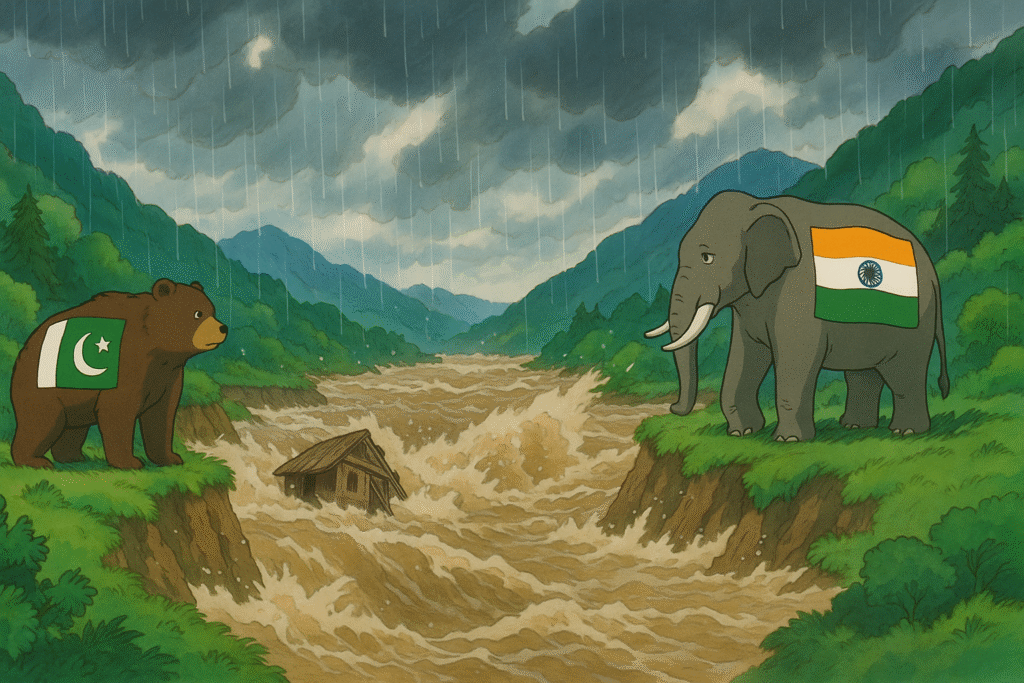Physical Address
18 C Ibbani Harohalli Village
Yelahanka Bengaluru 560064
Physical Address
18 C Ibbani Harohalli Village
Yelahanka Bengaluru 560064

Muzaffarabad, April 29, 2025 – Pakistan has accused India of deliberately releasing excess water from the Uri Dam into the Jhelum River, causing widespread panic and moderate flooding in Pakistan-administered Kashmir. The sudden surge in water levels, reported on April 26, has sparked outrage among Pakistani officials, who claim the move violates international water-sharing agreements and constitutes an act of “water terrorism.”
The flooding has primarily affected areas around Muzaffarabad and Hattian Bala, approximately 40 kilometres away, where local authorities declared a water emergency. Residents were urged to evacuate riverbank areas through mosque announcements and emergency sirens, leading to chaotic scenes as families scrambled to safety. Reports indicate that low-lying regions like Kohala and Dhalkot have suffered crop damage and livestock losses, though the full extent of the impact remains unclear.
Pakistani authorities allege that India failed to provide prior notification of the water release, a requirement under the 1960 Indus Waters Treaty, which governs the sharing of rivers between the two nations. The treaty, brokered by the World Bank, allocates control of the western rivers—Indus, Jhelum, and Chenab—to Pakistan, while India manages the eastern rivers Ravi, Beas, and Sutlej. Pakistani officials have condemned the alleged action as a deliberate escalation, particularly in light of India’s recent suspension of the treaty following a deadly terror attack in Pahalgam, Kashmir, which claimed 26 lives.
The Pahalgam attack, attributed by India to Pakistan-based militants, has intensified hostilities between the nuclear-armed neighbours. India’s decision to suspend the Indus Waters Treaty was announced as a retaliatory measure, with Indian officials stating that the suspension would remain in place until Pakistan ceased support for cross-border terrorism. Pakistan has denied involvement in the attack and warned that any attempt to block its water supply would be considered an “act of war.”
Local media in Pakistan, including Dunya News and ARY News, reported that the Jhelum River’s water levels rose dramatically, reaching up to 22,000 cusecs in some areas. While some officials noted that seasonal ice melt could contribute to higher water levels this time of year, the primary blame has been directed at India. “This is a clear violation of international norms,” said a spokesperson for the Muzaffarabad district administration. “India’s actions have put lives and livelihoods at risk.”
In response, India has not officially commented on the allegations of water release. However, Indian authorities have previously emphasized that their infrastructure, primarily run-of-the-river hydropower projects, lacks the capacity to significantly alter water flows into Pakistan. Experts suggest that while India could theoretically manipulate water levels to some extent, completely halting or diverting the Jhelum’s flow would require substantial new infrastructure, which does not currently exist.
The incident has further strained the already fragile relationship between India and Pakistan, with both sides exchanging sharp rhetoric. In Pakistan, public sentiment has turned to calls for international intervention, with some even urging China, a close ally, to restrict water flows into India as a countermeasure. However, no formal response from China has been reported.
As the situation unfolds, the people of Muzaffarabad and surrounding areas remain on edge, grappling with the immediate aftermath of the floods and the broader implications of a potential water conflict. With the Indus Waters Treaty in limbo, the region faces an uncertain future, where water a lifeline for millions—has become a new flashpoint in South Asia’s volatile geopolitics.